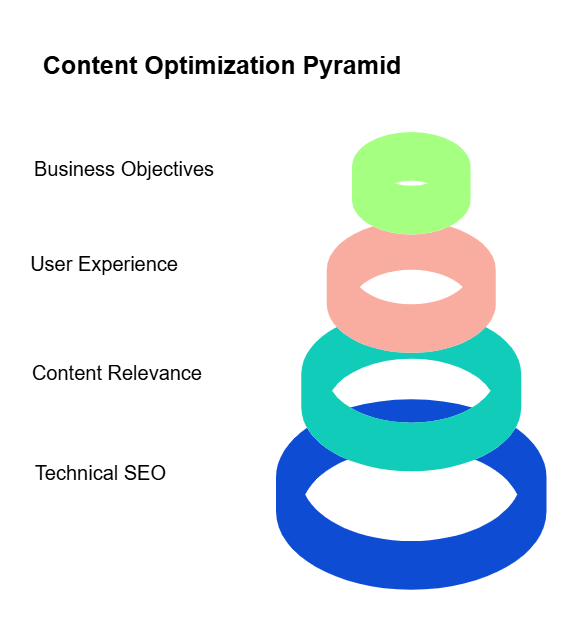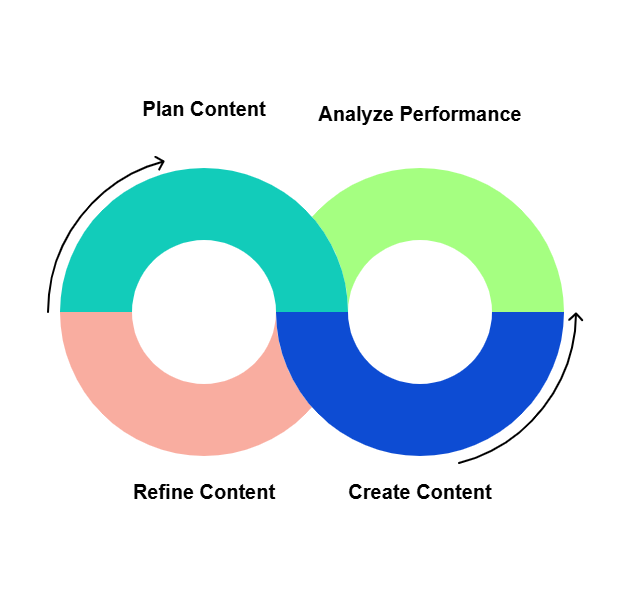I've put together a central resource for understanding and implementing effective content optimization. The reality is that simply engaging in content creation isn't enough. For experienced content professionals, the real challenge and opportunity lies in optimizing content to perform: to reach the right audience, engage them meaningfully, drive business goals, and solidify your brand's authority. Effective content marketing hinges on this.
Let's look at what it means to optimize content beyond just keywords. We'll explore its connection to overall website performance, user experience, search engine ranking, and even the burgeoning influence of generative AI. I'll also touch upon why content optimization is important for visibility in Google Search and other search engine platforms. By navigating the insights and resources linked here, you'll gain a deeper understanding of how to refine your content optimization strategy and ensure your content truly works harder for you.
The foundation: Understanding website and content optimization
Before getting into the nuances, it's important to grasp what content optimization means within the broader context of your digital presence. It's an ongoing process of refining your website and its content to achieve better search results, whether that's higher search rankings, improved engagement, or increased conversions.
To truly excel, understanding the fundamentals, including technical SEO, is key. For a clear definition and an overview of how various elements contribute to a well-optimized content portfolio, exploring a comprehensive take on website optimization is an excellent starting point. This foundational knowledge helps frame content efforts as part of a larger, interconnected system for achieving high quality content.
Moreover, a holistic approach to website optimization provides a strategic advantage. This encompasses everything from technical seo to user experience, all of which directly impact how your content is perceived and performs. By seeing content as a core pillar of this larger optimization strategy, and by focusing on creating relevant content, you can ensure your efforts are aligned with broader business objectives. This includes careful keyword research to understand search intent.

Driving revenue and engagement through superior user experience (UX)
One of the most impactful levers in content optimization is focusing on the user experience (UX) your content delivers. When users find your content easy to navigate, understand, and engage with, they're more likely to stay longer, convert, and view your brand favorably.
In fact, a thoughtful approach to UX is a direct driver of marketing revenue. This involves optimizing page layouts, ensuring readability, providing clear calls to action, and making sure your content directly addresses user needs and pain points.
Effective content optimization through a UX lens means anticipating what your audience is looking for and presenting it in the most accessible and satisfying way possible. This could involve structuring blog posts for scannability, using compelling visuals, or ensuring your content answers questions thoroughly and authoritatively.
When user experience becomes a central part of your content strategy, the path to increased engagement and revenue becomes much clearer. Don't forget to optimize your older content as well; refreshing it can yield significant SEO benefits.
Navigating the new frontier: Generative AI in content optimization
The rise of generative AI presents both exciting opportunities and new considerations for seo content optimization. While AI tools can assist in brainstorming, drafting, and even refining content, understanding their role and limitations is vital for maintaining quality and authenticity. Experienced professionals are now asking: is generative AI a helpful assistant or a replacement for content marketing practices?
The answer lies in a balanced approach. AI can help scale certain aspects of content creation and identify optimization opportunities. But human oversight, strategic input, and a deep understanding of your audience and their search intent remain irreplaceable. Using AI for content optimization could involve tasks like generating meta descriptions, suggesting content improvements, finding internal linking opportunities, or even helping to repurpose existing content for different channels like social media. The key is to leverage these tools smartly, ensuring they enhance, rather than dilute, your unique brand voice and strategic goals.
Leveraging tools and features for smarter optimization
To effectively implement a content optimization strategy, having the right suite of content optimization tools and understanding their capabilities can make a significant difference. While specific platform features vary, the underlying principle is to use technology to gain insights and streamline your optimizing content workflows. For instance, many platforms offer features that can help you identify SEO issues via integration with Google Search Console, check for content quality using various metrics, monitor accessibility, and track performance through integration with Google Analytics.
Thinking about how to use essential features to their full potential within your chosen toolset can unlock new levels of efficiency and effectiveness. This could involve setting up regular content audits, using analytics to pinpoint underperforming content that needs an optimization refresh, or employing tools to ensure consistency across your digital presence. The goal is to transform data and features into actionable insights that lead to better content performance and superior search engine ranking.
The continuous journey of content optimization
Content optimization is not a one-time task but a continuous cycle of planning, creating, analyzing, and refining. It’s about strategically enhancing every piece of content to meet both user needs and business objectives, ensuring you consistently deliver great content. By focusing on a solid foundational understanding, prioritizing user experience, thoughtfully integrating new technologies like AI, and leveraging the right content optimization tools, you can ensure your content consistently delivers value and improves its standing in search engine results. This dedicated approach to optimizing content and your overall content strategy is fundamental to successful content marketing.

I encourage you to explore the linked resources to deepen your understanding of each facet of content optimization. By doing so, you'll be better equipped to elevate your content strategy, drive meaningful results with high quality content, and solidify your position as an authority in your field. Remember that even elements like title tags and ensuring your relevant keywords are well-placed are part of comprehensive seo content optimization.

